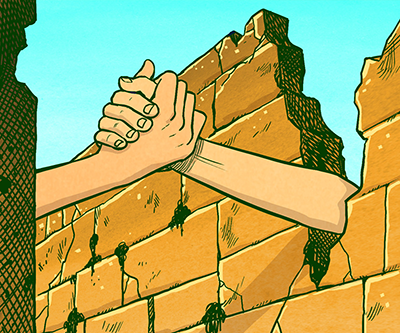Being Jewish
Commentary
Holidays
Tisha B'Av
On Tisha B’Av, Remembering Divisions That Destroy

The rabbis of the Talmud worried over why the Holy Temples in Jerusalem were laid waste, and then the city itself. The Temples were grand achievements; around them a civilization alive with culture and spirit thrived. Their destruction—memorialized on Tisha B’Av, which begins the evening of July 31—was a cataclysm: Many people died and so, very nearly, did Judaism. Why would such tragedy happen?
We must have done something awful, the rabbis reasoned. Abaye said it was because Jews failed to keep the Sabbath. Abbahu said it was because Jews stopped praying. Hamnuna said it was because they stopped teaching sacred texts to their kids. Ulla said they became shameless about sin. Judah offered that people scorned scholars. Raba said integrity had disappeared.
Two explanations stuck most. Both found the reason for the destruction not in this or that behavior, but in the way people treated one another. Rabbi Yohanan said that “Jerusalem was destroyed because they judged people in accordance with the law”—strictly, and without mercy or understanding (Baba Metzia 30b). Another rabbi, unnamed, said that Jerusalem was destroyed “because it was filled with baseless hatred” (Yoma 9b). The Temples were destroyed not because Jews were bad, but because they were severe and mean: Their hearts were hard.
All this is on my mind as Tisha B’Av approaches. We live in a time of outrage. My daughter was called a whore not long ago by a man at the Kotel enraged at women praying at the holy site. At a Tel Aviv ceremony memorializing Jews and Palestinians killed in the conflict between the two people, a protester spat on me: “Take off your kippah, traitor!” he shouted. Recently, a left-wing columnist wrote that the vision of the right is “apartheid and fascism.” Another regretted that religious settlers could not be killed.
On the right and left, among religious and secular, many conclude that people they disagree with are destroying their homes, debasing their heritage and unraveling their future. In America, too, people rage and trade disparagements, convinced that others are wrecking the country.
In fact, both Israel and the United States thrive in ways our grandparents could not imagine. With each year, Israel becomes a more inclusive society for all its citizens—Mizrahim, women, LGBTQ folks and Palestinians. America has as well, with three current Jewish Supreme Court justices, two of them women, and African-Americans who served as secretaries of state, army chief of staff and, of course, president. Still, both countries give us reasons to worry. They can seem lost, their vitality sapped and purpose diminished. In both places, we search for the authors of our distress: damn right-wingers or left-wingers, religious zealots or godless libertines. We divide between us and them.
But, as some of the rabbis of the Talmud knew, the greatest threat we face is our own tendency to create divisions and look at brothers and sisters as others. In both Israel and America, there are disagreements about things that matter: war and peace, prejudice and injustice, equality and fairness. But my daughter is not a whore, I am not a traitor and the people I disagree with are not fascists promoting apartheid. These others are not the authors of our distress. If we are to solve the problems we face, they will be co-authors of our shared salvation. Either we learn to go forward with them—by arguing, persuading and listening with empathy and an open heart—or everything that we and our parents and theirs have built over generations will fall apart. In this sense, they are all us, and not them.
These rabbis understood this. I hope in our troubled time, we will come to understand this, too.
Noah Efron teaches at Bar-Ilan University in Ramat Gan and is host of The Promised Podcast. His most recent book is A Chosen Calling: Jews in Science in the Twentieth Century.










 Facebook
Facebook Instagram
Instagram Twitter
Twitter
Milton Sabin says
Controversy among Jews will always be with us, made enormous by social media.
Diaspora Jewry must understand that they cannot impose their ideas on Israel.
I recently wrote to a leader of a major Jewish group in South Florida:
Do not threaten Israel!
Do support Israel’s war effort against its mortal enemies!
Do not threaten Israel!